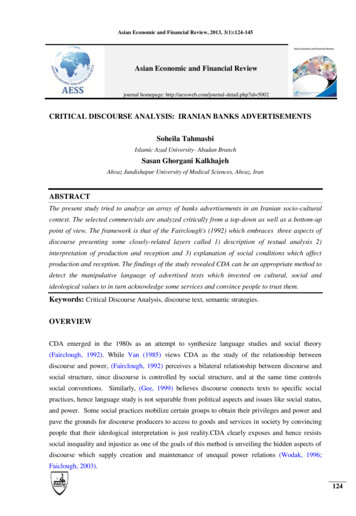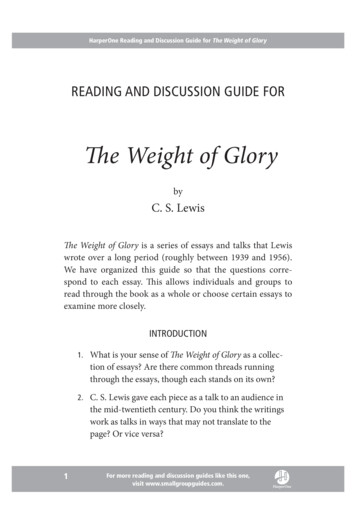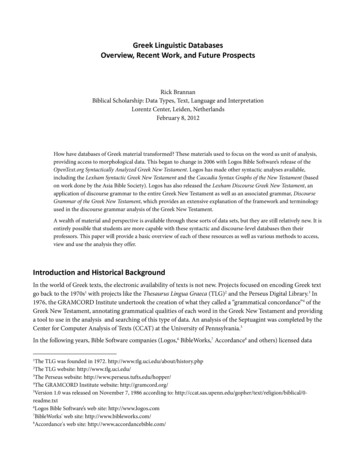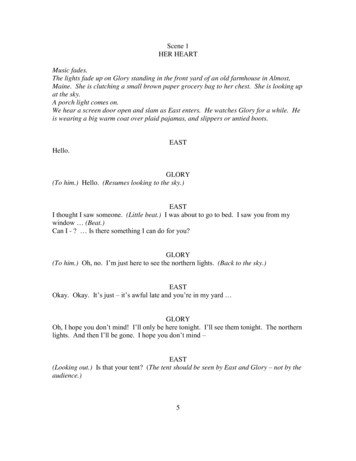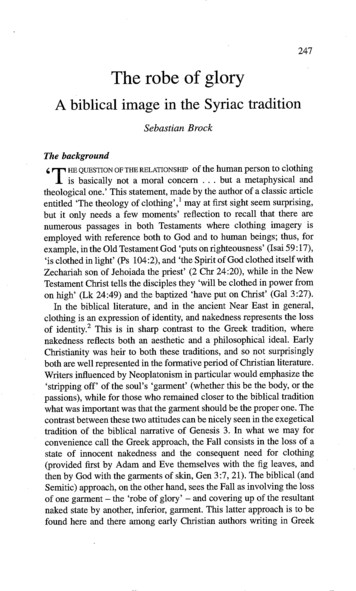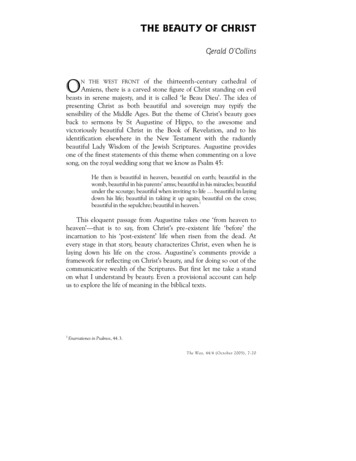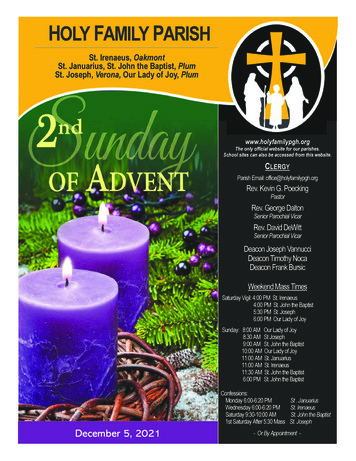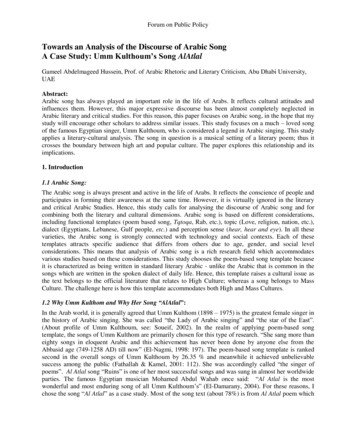
Transcription
A Discourse of the Glory of the GospelBy Thomas GoodwinTable of ContentsChapter I: The words of the text (Col. 1:26, 27) explainedChapter II. The excellency of the gospel proved from the profoundness ofthe knowledge revealed in it.Chapter III: Another demonstration of the excellency of the gospel, that itis a secret mystery, a hidden and concealed wisdom.Chapter IV: That the knowledge of the gospel is a most excellent wisdom,because, as a peculiar favour, it is communicated by God only to somepersons.Chapter V: The excellency of the gospel consists in the riches of spiritualknowledge manifested in itChapter VI: That the gospel is most excellent, because it is a mostglorious revelation of God and Christ to us.Chapter VII: How it is the glory of the gospel, that Christ is not onlyrevealed in it, but Christ so known by the believer is in him.Chapter VIII: The glory of the gospel farther manifested, forasmuch asChrist, the great subject of it, is, in the work of God upon us, revealed inthe soul.
Chapter I: The words of the text (Col. 1:26,27) explained.—Though God had before byvarious ways discovered the gloriousmysteries of his grace, yet the revelation ofthem by the gospel excels all the other.Even the mystery which hath been hid from ages and fromgenerations, but now is made manifest to his saints: to whom Godwould make known what is the riches of the glory of this mysteryamong the Gentiles; which is Christ in you, the hope of glory.—COL.1:26, 27.THE apostle, in this chapter, from the 13th verse to the end, draws alively character of Christ and his gospel.1. He describes Jesus Christ in all that fulness of the riches of his glorywherewith he is arrayed and represented in the gospel, from the 13thverse to the 23d.2. He falls into a commendation of the gospel, which is that mysterywherein is made known the rich glory of Christ, who is the glory of thismystery. And if the story that makes Christ known be so full of riches andglory, what then is Christ himself, the subject of it?The apostle doth both these on set purpose (as in the 4th and 8th versesof chap. 2, he professeth), to divert and take off these Colossians, mindfrom those vain, deceitful speculations of philosophy, and the ceremoniallaw, and traditions of men, gaudily and speciously set out with enticingwords, 'philosophy and vain deceit.' He exposeth the beggarly conditionof those rudiments (as he names the best of them, Gal. 4:9); and todisplay the glory and riches of the mystery of Christ in all its brightness,he makes the enticing lustre of all other wisdom, which had almost
spoiled that glory of Christ (Col. 2:8), to vanish.In the words of my text, Col. 1:26, 27, the current of his praise of thegospel's glory swells highest, and runs with the deepest and strongeststream; within the limits of which, therefore, I will confine myself(though much might be added from other Scriptures) as affording matterabundant to set forth the glory of the gospel, by all that doth commendunto us any other knowledge.1. You have here the rise and original of it, as withal of man's salvation;how, and for what ends God contrived it and revealed it, and to whom.The great God (says he) took up a mind and purpose to reveal unto hissaints infinite riches of his glory in it, and by it: and to that end framedthis wisdom on purpose for them, and them alone. 'It is made manifest tohis saints, to whom God would make known his riches and glory by it.'2. You have the subject of it, and common treasury of all that riches andglory discovered in it, which is Christ, God's Son. 'Which riches is Christ,'says the apostle by way of explanation. Now Christ's riches areunsearchable (Eph. 3:8), and this doctrine of the gospel is the field thistreasure is hid in; and Christ being also 'the Lord of glory' (1 Cor. 2:8),hath filled it with a glory answerable, with 'riches of glory.'3. You have the gain and benefit of it. For it reveals God and Christ, andall his riches and glory; so being received and entertained by spiritualknowledge and manifestation in the hearts of men, it makes those saintspossessors thereof, by giving them a possession of Christ. And for yourfurther security, you have them in you, by having him in you (who is thetreasury of all those riches) at the present. But then, the gloriousknowledge of this Christ, as he is in you, is yet a future pledge of a greaterand more transcendent glory to come, greater than this gospel can reveal,or can be made known to you. 'Christ is in you the hope of glory.'4. You have added hereunto all sorts of excelling properties and royaltiesto commend the glory of the gospel, above all that are or can be supposedto be in any other knowledge. (1.) If depth and profoundness sets a value,this is a mystery in every line of it. (2.) If preciousness and abundancemakes any knowledge estimable, this is full of riches and glory. (3.) If
secrecy puts an esteem on any science, this 'hath been hid from ages andgenerations, but now made manifest.' (4.) If it recommend anyknowledge, that when the secret is revealed, yet still it be not madecommon to the ordinary sort of men, then the gospel is most excellent;for though God hath revealed it, yet he retaineth and useth that art inrevealing of it, that he makes known the riches and glory of it only to 'hissaints;' others know it but in the outward letter of it.1. I shall take a view of the rise and original of the revelation of thisglorious mystery. I cast the brief story thereof into this frame.(1.) Our all-wise and infinitely blessed God, possessing in himself infiniteriches of glory, he thinks of ways to make them known, and that to somereasonable intelligent creatures, which by knowing of them might bemade partakers thereof, and have their bosoms filled with all his riches;for both to make them known, and withal to make them possessorsthereof, are in the text: the one in these words, 'make known;' the other inthose, 'Christ in you the hope of glory.' The text says, ἡθέλησεν, 'hewould,' he had a mind and a will, a longing desire to do it, andcommunicate it to us, to make us blessed. That is the first thing. 'Hewould make known,' &c.(2.) The second thing to be considered is the persons, to whom. The textsays, 'to his saint.' His, that is, his elect, whom he hath chosen to be holy,his saints, who are first his own by election, and then made saints.[1.] They are his, singled out from all the rest to be his peculiar, his elect.'The Lord knows who are his.' 'Thine they were,' (says Christ, John 17:6),'and thou gavest them to me; and they have kept thy word.' And 'Father'(says Christ, Mat. 11:25), 'I thank thee thon hast hid these things from thewise and prudent, and hast revealed them to babes; even so it pleasedthee.'Yet [2.] he makes them saints, to whom he communicates himself: yea, hemakes them saints by making himself known to them. Judas (notIscariot) asked Christ, John 14:22, this bold question, 'How is it that thouwilt manifest thyself unto us, and not unto the world.' Christ therementions not the first part of this account here, namely, that they were
his peculiarly, and not the world (which yet being alone with his Father inhis prayer, he then takes occasion to mention, to move him) but he givesthem this other part of the account here. Because (says he) I manifestmyself to saints, which you are, and I will cause you to be. His wordsafore (in which Judas interrupted him) were these, at ver. 21, 'He thathath my commandments and keepeth them, he it is that loveth me, andhe that loveth me shall be loved of my Father, and I will love him, and willmanifest myself to him.' And his words in answer to Judas fully import it,ver. 23. 'Jesus answered and said unto him, if a man love me, he will keepmy words: and my Father will love him, and we will come unto him, andmake our abode with him.' This answer was needful for their quickeningto obedience.(3.) The third thing I add to this head is, that God had afore the discoveryof this gospel, taken other ways to make known something of the riches ofthis glory by them; but yet had all that while kept and retained thisknowledge of the gospel as the last, to excel, and exceed, and to put downall the former; which yet is but a preparation to that other discovery inthe heavens, as all those former were to this.Both these assertions are clear. The first is evident from those words, 'henow hath made manifest,' that which was hidden from all ages, &c. Andyet we know that former ages had much of the wisdom of God amongthem, both Jew and Gentiles.The other assertion is evident from this, that the utmost discovery of thismystery, and of Christ now, is but the hope; and so not the possession ofthat glory which is to come. We are led therefore to consider a little thoseother ways God had already taken to manifest the riches of his glory by,as an ante-masque to this that followed.[1.] One way by which he began to manifest his glorious back-parts(Exod. 33:23), both to angels and men, was by the first creation and theworks thereof, and in the law and covenant of works. Whereof the firstholds forth his eternal power and Godhead, 'because that which may beknown of God is manifest in them; for God hath shewed it unto them. Forthe invisible things of him from the creation of the world are clearly seen,being understood by the things that are made, even his eternal power and
Godhead; so that they are without excuse,' Rom. 1:19, 20. 'The heavensdeclare the glory of God; and the firmament sheweth his handy-work,' Ps.19:1. And the angels, that were spectators of every day's work, wereinfinitely taken with it: 'Whereupon are the foundations thereof fastened?or who laid the corner-stone thereof; when the morning stars sangtogether, and all the sons of God shouted for joy?' Job 38:6, 7. Theyshouted for joy to see him finish every day's work. Then his wisdom alsois displayed in governing so great a host, an army of several creatures, toseveral ends, by perpetual laws. I instance but in one, the placing of thesun in the heavens and the motion of it, so disposed and ordered as itcould nowhere else be placed therein without an apparent inconvenienceto some parts of the habitable world. But he hath made a tabernacle for it,and set out the course thereof to visit all the earth. It goes to its tropics,and misseth not a hair's breadth. There is infinite justice also apparent inhis righteous law, and withal infinite holiness in so exact a rule ofrighteousness, which was the Jews wisdom and glory in the sight of allnations. For the delivery of which law God come down, and made aheaven upon a dirty mole-hill, Mount Sinai, and constituted Moses amediator, and put a glory upon his face, and then dressed up a high priestgloriously for his worship, and erected a tabernacle, and after that atemple admirably magnificent. How did the Jews boast of all thesethings! Rom. 2.[2.] But all this contented not our God, who would make known a furthermystery, viz., of the redemption of fallen man by Christ, which he kepthid and close in his own breast, and not a creature knew it, no, not hisangels (not as we now know it in the gospel), which were his nearestcourtiers and dearest favourites. It lay hid in God, Eph. 3:9, hid evenfrom them, ver. 10. It was a mystery which, when revealed, should amazethe world, and put the angels to school again; as if they had knownnothing in comparison of this, wherein they know over again all thoseglorious riches which are in God, and that more perfectly and fully thanever before. Such is the mystery of Christ revealed in the gospel, which isthe last edition also that ever shall come forth in this world, and is nowset out, enlarged, and perfected; wherein that large inventory of God'sglorious perfections is more fully set down, with addition.
The reasons why God did by two ways intend to manifest himself thusvariously are:First; Because he would shew forth his manifold wisdom, which is thereason given of revealing the gospel, Eph. 3:10, 'that to the angels mightappear the manifold wisdom of God.' His wisdom is so vast and large,that he could vary, and take more ways than one to display it. And as hehad two sorts of reasonable creatures to shew himself unto, so he had adouble way, a double sample, and double method.Secondly; God did so, because indeed that other way was of itself tooobscure and too imperfect.First, It was too obscure; for in the gospel and works of redemption, theangels came to see all that they saw before, and that more clearly andlargely. They see more power in Christ, 'the power of God,' 1 Cor. 1:24, inraising himself up from death to life, 'declared with power thereby to bethe Son of God,' Rom. 1:4. And they see also the exceeding greatness ofhis power in raising us up also, Eph. 1:19, more than they did in thecreation. They likewise see a greater and clearer instance and manifestoof his justice in putting to death his own Son, taking on him to be a suretyfor sinners, than if a world of worlds should have been damned for ever.And in Christ his Son also they came to see a greater and far moretranscendent righteousness than ever appeared either in the law orinherent in themselves.Secondly, That other way was but imperfect.For those attributes which God accounts his greatest riches and greatestglory, Rom. 9:23, even his mercy and free grace, which he intends most toexalt, never saw light till now.But not only more of his attributes come thus to be discovered, butfurther, the glorious mystery of the Trinity come thereby to be moreclearly unfolded, if not the first discovery made of the three persons;there being scarce the footsteps of them distinctly to be seen in the worksof creation or in the law. But now, when the gospel comes to be revealed,and the work of salvation in it, then they were discovered to be 'three
witnesses in heaven,' 1 John 5:7, witnesses to our salvation. And theirseveral witnessing comes to be known by their several seals and handworks, set severally to our salvation, bearing the stamp and similitude oftheir three several subsistences; so as by those three seals of the electionof Christ and us, of our redemption and of our sanctification, we mayknow there are three persons, and how they do subsist; even as in men'sseals their several arms being engraven, their houses and antiquity areknown.(4.) The fourth thing is, what new model or means it was which Godsingled forth to print and publish his whole and utmost counsel to us by,after all those other; the edition of which should thus excel all the former,and alone be full and adequate, and commensurable to his whole design;even to manifest and communicate the whole, the full of all those richesof glory in himself, but once for all, and no more, that he shall not need tosuperadd any other, until himself immediately communicates himselfface to face. The text tells us that this excellent way of discovery is Christcommunicated to us, it is 'Christ in us, the hope of glory.' Which notesout, not only Christ to be the revealer, 'the prophet' (as Moses styles him)who by word of mouth or way of doctrine should discover the glory ofGod (which the apostle fully renders to the scope I have driven at, Heb.1:1, 'God who at sundry times, and in divers manners, spake by theprophets, hath in these last days spoken unto us by his Son'). Whereasaforetimes God by degrees and by piecemeal, πολυμερῶς, utteredhimself, one truth at one time, another at another, by drops; so it was forthe matter; and πολυτρόπως, after sundry fashions and forms andshapes, such as were dreams, visions, types, &c.; so for the manner. ThisGod hath now (as the opposition imports) once for all, in the last daysand by wholesale, uttered his whole counsel, and this uniformly after oneonly plain and clear manner and way, by word of mouth from his Son,spoken by his Son, as the revealer. So it follows, chap. 2 ver. 3, 'Which atfirst began to be spoken by the Lord' (namely, Christ), but not only so,but that which the text here holds forth is, that Christ, as the argument,subject, matter, is the thing revealed. That alone takes up and fills up thewhole of this new doctrine; which mystery (says he) is Christ, namely,subjective. It is Christ known and communicated; and in him all God'sriches and glory.
1. In him all the riches of God and the knowledge of him are laid up, asthe treasury and subject of them; and so discovered and communicated tous objectively in the knowledge of him. Thus, chap. 2 ver. 2, 3, the apostlefurther explains it. For having termed the gospel (as here) the mystery ofGod and of Christ, he adds, 'In whom are hid all the treasures of wisdomand knowledge;' not only to be revealed by him, or subjectively known inand by himself; but (which is the proper scope of the apostle) objectivelyset forth, and contained in him alone, and in the knowledge of him madeknown to us.2. In him shines 'the glory of God' (2 Cor. 4:6, 'The light of the knowledgeof the glory of God in the face of Jesus Christ'), as the lively image of allhis features and perfections, and evidences of his inward counsels andaffections. That therefore which I here insist upon is, that Jesus Christ inall his glories is the great and eminent subject of the gospel, Rev. 1:1.3. It is the gospel of God (namely, as the author of it), but it is concerninghis Son Jesus Christ our Lord. God had but one Son, and he made thisgospel on purpose to honour him, and set him forth. It is all, and everyword of it, some way or other concerning him, or about him. God made itpurposely to set his Son Christ forth to us; and in setting forth his Son,himself also. It is therefore termed (chap. 2 of this epistle, ver. 2) 'themystery of God the Father, and of Christ,' Christ, in that series of truthsabout him held forth in the whole New Testament, is the sum of thisnewly revealed wisdom of God, 1 Cor. 1:24.So then, God's Son, first made our Christ, and that by being made man, isthereby further made a complete body and system of a new wisdom orknowledge of the glory of God. And correspondently is that speech of theapostle, chap. 2 ver. 2, to be understood, 'that their hearts might becomforted, being knit together in love, and unto all riches of the fullassurance of understanding, to the acknowledgment of the mystery ofGod, and of the Father, and of Christ.' This was that subject whichterminated the apostle's thoughts, as the horizon doth the eye; heregarded not to look beyond it to anything else. And surely, if unto Godhimself his Christ is an aboundary, a sum of that wisdom manifestative,whereby he would make himself known to us, and rest contented therein,as the last and fullest till we come to glory, then he may well be so to us,
and may we reckon ourselves complete in him, as Col. 2:10. Howcomplete and lively a representation Christ, as revealed in the gospel, isof the riches of the glory of God to be manifested to us, in comparisonwith all other, I shall shew by and by, when,4. In the fourth place, I have added this, how real and lively ademonstration or setting forth of Christ this our gospel, the mystery hereis. The story of that is this: the apostles that lived and conversed withJesus Christ saw with their own eyes. He dwelt amongst us (says theapostle), John 1:14: God wearing flesh and blood about him andappearing in it, was God manifest in the flesh personally, 1 Tim. 3:16. Andso they had the privilege in his person to behold his glory. 'And we beheldhis glory' (says he), 'the glory as of the only begotten of the Father;' solively representing the glory of the Father, that if they knew him, theymust needs know the Father; John 14:9, 'Have I been so long time withyou, and yet hast thou not known me, Philip? He that hath seen me hathseen the Father, and how sayest thou then, Shew us the Father?' Theybeheld it also in his doctrine, in his works and words, and graciousconverse, full of grace in his converse, and truth in his doctrine, as itfollows there. 'That which we (says John) have seen with our eyes (1 John1:1), which we have looked upon, and our hands have handled, of theword of life.' Ver. 2, 'For Christ our life was manifested,' &c. And when hewas gone to heaven, the Holy Ghost came down and caused them tounderstand the end and intent, the use to us, the benefits and the fullmeaning of all he did and said. He turned and translated to them the darkmystery of his sufferings written in blood, which they understood not, hisresurrection, &c., into a familiar language to be understood and learnedby lost sinners, of remissions of sins; redemption through his blood;dying, rising for them, in their stead; and a thousand such gloriesredounding to us, and in us, that are the fruits and results, andreverberations of all he did and acted. The Holy Ghost came and took ofhis, even all that he had done, and unciphered and unriddled it, shewed itto them (as Christ says, John 16:14); and so glorified Christ afresh in thatcomment of gospel light he caused to shine in their hearts. 'He shallglorify me, for he shall receive of mine, and shall shew it unto you.' Andby them were all these things in their sermons reported; as Peter speaks,1 Pet. 1:12, 'These things which are now reported by them (said he) that
have preached the gospel to you, with the Holy Ghost sent down fromheaven.' And whilst they thus preached him, God gave forth by theirministry 'the light of the knowledge of the glory of God in the face ofJesus Christ,' 2 Cor. 4:6, even 'the light of the glorious gospel of Christ,who is the image of God,' ver. 4.But, alas! as Christ himself was gone to heaven, and had taken up hisglory with him; and those that were eye-witnesses of it, and should reportit unto us, are likewise gone off the stage: the Holy Ghost thereforecaused them to leave a frame and doctrine of the gospel in their writings,both the story of his life and death by the evangelists, which is but Christwritten in ciphers; and in their epistles, which give that story forth inplainer letters, opening the use, and end, and intent of all. And thesewritings opened by the Holy Ghost, and the ministers of the gospel holdforth all pieces of it, and being set all together, make an express pictureand image of Christ, and all his glories, who is the express image of theglory of God; and is therefore called the glorious gospel of Christ, thesubject of it, who is the image of God, and whose glory this holds forth.Thus (as Paul preached to the Galatians, Gal. 3:1), before our eyes JesusChrist hath been pictured, προέγραφη, depictus fuit; and that so reallyand lively, that he is bold to affirm, he was crucified among them, even aswell as at Jerusalem. The Holy Ghost did set them down (as it were) atJerusalem by the cross, and brought him forth crucified before the veryeyes of their faith, as really and expressly as if they had seen it done withtheir bodily eyes. Let any other tragic story be told by the quickest andmost poetic fancy, and it cannot be said that it was done or perpetratedamong them to whom it was told. But the story of Christ and his truths,and all that is told, is said to be done among them, whilst it is a-telling.Yea, further, the glorious gospel, accompanied with the Spirit, is not onlycompared to a picturing or painting by colours, the most lively andartificial that can be supposed, as in that Gal. 3:1; but further, it iscompared to the real image of a person in a glass, in which you see hissoul shines out in all the casts of his eyes, in all the postures of hisdemeanour, and all this in that sparkling manner, as if all the angelswould limn or draw a picture, they could not come near it. This you havein 2 Cor. 3:18, compared with 2 Cor. 4:4, 6. In the one he says, 'We seethe glory of God in the face of Jesus Christ, in and by the glorious gospel.'
In the other he compareth the other to a glass, 'We all behold as in aglass, the glory of the Lord.' That look, how far more lovely* therepresentation of a person is seen in a glass, above what in a picture; so isChrist in this gospel. Let all the curious artists in the world conspire topaint the sun, and bring all their orient brightest colours, and let a childbut come and bring a looking-glass; and what a wan, pale thing is the one,to the glory, splendour, and reality of the other. The riches of the glory ofthe sun, no painting or colours can ever render; but a looking-glass doth.And such is the revelation in the gospel made to believers. 'We thereinbehold as in a glass the glory of the Lord;' and therefore he calls it theglorious gospel of Christ, even as in the text.If you ask how this comes to pass? I answer, By the Spirit thataccompanies it. So in that 2 Cor. 3:18, 'Even as by the Spirit of the Lord,'it is added. If the Spirit of revelation, as it is called, Eph. 1:17, accompanynot this ministry and descriptions of Christ, they are but as pictures, or asdead words used to set forth any other narration. But the gospel being theministration of the Spirit, he hath a peculiar act to bring down the realsubsistence, (as Heb. 11:1), of the things themselves uttered about Christ,which put together make up this image of Christ, in the understandingand spirit of the soul and mind. Can Satan make a lively shadow of aperson long since dead, by condensation of colours, and his light shiningtherein, appear to the eye? The Spirit can do this much more of Christ, soas though you see him not in that glory as he is (1 John 3:2), in heaven,yet the spiritual glory of Christ you see in every truth the gospel utters ofhim; and have real communion with him thereby, 1 John 1:2, 3, even asby laying your eye to the least beam of light that comes in at a cranny in adark room, you see the glory of the whole sun. And as you cannot see thesun, but by its own light, so, nor Christ, but by a light let down fromhimself, which the Spirit that is in his heart, and in ours, gives.If you will ask how? I answer, By creation. So in that 2 Cor. 4:6. God thatcommanded the light to shine out of darkness, hath shined in our hearts,to give us the light of the knowledge of the glory of God, in the face ofJesus Christ.' The words we speak and utter of his glory are but words,and would be no more, though we were able to set them out with thetongues of angels. But if that Spirit that is in Christ's heart, and lies hid in
this word (as the promise is, 'My Spirit and my word shall not depart outof thy mouth'), if he accompanies it to our hearts, he presents the things,and the real images thereof to our souls in and through those words. Heturns verba in res, as that philosopher when converted acknowledged.Which he doth to no other men but to his saints, 'to whom he would makeknown,' &c.So then to shut up this; suppose you had an absent friend alive, whomloving, you desire at times to behold in his converse and behaviour, andloving aspect to you; and a picture of him did not content you, but youhad a glass, into which at times the lively image came, and in which heappeared to you really in such and such deportments: such is the gospelwhen the Spirit accompanies it, and conveys Christ spiritually, and withthe sight of faith to the soul. And this will help us to understand why he iscalled 'Christ in us;' of which hereafter.How should we prize and value such a glass as this, preserve it fromsoiling, spots, or breaking, and suffer it not to be perverted! You rejectsuch as are false and misrepresent; you affect pure and clear ones; ohthen, keep to and preserve the gospel in its purity. You see your husbandin it, and his beauty, every day.5. How completely doth this gospel hold forth the riches of the glory ofGod in the person of Jesus Christ, as a redeemer and crucified, 2 Cor. 4:4,and 6, compared with 1 Cor. 1:23, 24. The word is ἔν προσώπῳ, 2 Cor.4:6. John 1:18, 'No man hath seen God at any time' (John 1:18), 'the onlybegotten Son, which is in the bosom of the Father, he hath declared him,'ἐξηγήσατο, which word (as your late critics* observe) Enarrationemnotat, non tam sermone aut prædictione, quàm expressione etrepræsentatione factam. It expressed him to the life, and brought Godforth out of his invisibility, Christ being (Col. 1:15) 'The image of theinvisible God.' There is indeed a full and complete image of the glory ofGod, which shineth in his person, as he appears in heaven, whereof John,James, and Peter had a glimpse, which transcends infinitely all thatwhich the gospel can, or the Spirit of the gospel doth reveal of him. Andby this glory (John 17, 'That they may be where I am, and see my glory')we shall see and understand by converse with him in heaven more,infinitely more, of the glory of God in and by him. But this glory the
gospel treats not of, but only hints; we discern it but by collecting whatglory must needs be due to that man in whom the fulness of the Godheadpersonally dwells. But that image of God which in Christ this gospel holdsforth, is but the hopes of that other glory, and is a lower thing than thatwhich his person wears in heaven.And yet this discovery of God in Christ transcends whatever any way wasor could otherwise have been made. The 'back-parts' of God, which wecall his attributes, his power, wisdom, truth, justice, which God calls hisglory to Moses, Exod. 36, and which we cannot see and live: these areinfinitely more really and substantially, and to the life, set forth to us, bywhat we know of Christ as a redeemer in the gospel; and do infinitelytranscend whatever of them either was, or could have been expressed inmillions of several worlds, filled all of them with several sorts ofintelligent creatures, such as angels and men, to never so great a variety,as the πολυποίκιλος σοφία of God could have diversified the natures ofthem into.There is a threefold image of God in Christ.1. As he is his Son, without the consideration of his dwelling in an humannature; and so he is unto God the Father that image of himself by whomhe understands himself. And were he not equal wit
A Discourse of the Glory of the Gospel By Thomas Goodwin Table of Contents Chapter I: The words of the text (Col. 1:26, 27) explained Chapter II. The excellency of the gospel proved from the profoundness of the knowledge revealed in it. Chapter III: Another demonstration
